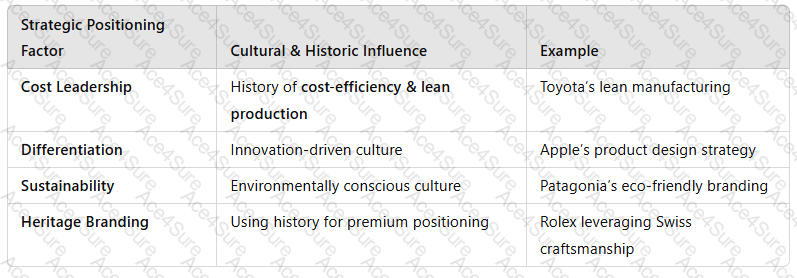How Culture and Historic Influences Impact Strategic Decisions and Market Positioning
A business’sstrategic decisionsandpositioning within the marketplaceare shaped by bothorganizational cultureandhistorical influences. These factors affect how a companydevelops strategy, interacts with customers, manages employees, and competes globally.
1. The Role of Organizational Culture in Strategic Decisions
Organizational culture is theshared values, beliefs, and behaviorswithin a company. It influencesdecision-making, innovation, and competitive advantage.
????How Culture Affects Strategy
✅Risk Appetite– A culture that embraces innovation (e.g., Google) will invest in R&D, while risk-averse cultures (e.g., traditional banks) focus on stability.✅Decision-Making Speed– Hierarchical cultures (e.g., Japanese firms) rely on consensus, while Western firms (e.g., Apple) may have centralized decision-making.✅Customer Engagement– Acustomer-centric culture(e.g., Amazon) leads to investment in personalization and AI-driven recommendations.
????Example:
Toyota’s Kaizen Culture (Continuous Improvement)has shaped itslean manufacturing strategy, giving it a competitive advantage in cost efficiency.
2. How Historic Influences Shape Business Strategy
Historical events,past business performance, economic trends, and industry evolutionshape how businessesposition themselves in the marketplace.
????How History Affects Strategy
✅Legacy of Innovation or Conservatism– Companies with a history ofinnovation(e.g., IBM, Tesla) continuously push boundaries, while firms with traditional roots (e.g., British banks) focus on risk management.✅Economic Crises and Financial Stability– Businesses that survived financial crises (e.g., 2008 recession) tend to developrisk-averse financial strategies.✅Market Reputation and Consumer Perception– A stronghistorical reputationcan be leveraged for branding (e.g., Rolls-Royce’s luxury image).
????Example:
Legonearly went bankrupt in the early 2000s, leading it toredefine its strategy, focus ondigital gaming partnerships, and revive its brand.
3. The Influence of National and Corporate Culture on Global Positioning
When expanding globally, businesses mustalign their strategies with different cultural expectations.
????How Culture Affects Global Market Entry
✅Consumer Preferences– Fast food chainsadapt menusfor local cultures (e.g., McDonald's in India offers vegetarian options).✅Negotiation & Communication Styles– Business negotiations inChinaemphasize relationships ("Guanxi"), whileWestern firmsprioritize efficiency.✅Leadership and Management Approaches–German firmsemphasize engineering precision, whileSilicon Valley firmsprioritize agility and experimentation.
????Example:
IKEAmodifies store layouts in different countries—small apartments in Japan vs. large home spaces in the U.S.
4. Strategic Positioning Based on Cultural & Historic Factors
A company’s historical and cultural influences define itspositioning strategy:
 A screenshot of a white box
Description automatically generated
A screenshot of a white box
Description automatically generated
Conclusion
A business’sstrategic decisions and market positioningare deeply influenced byorganizational culture, national culture, and historical performance. Companies thatleverage their cultural strengths and adapt to market historycan achievelong-term competitive advantage.